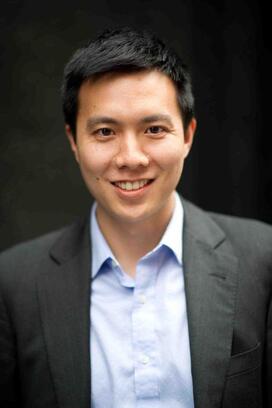Jamal Motlagh ’06 and Michael Zhang ’08, Custom Clothing Gurus

Jamal Motlagh ’06 and Michael Zhang ’08 didn’t try to be the best-dressed students during their Princeton years. The California-minded Motlagh most often wore backwards baseball caps, T-shirts and shorts, even in winter. Zhang went for shorts or slacks and school T-shirts or sweatshirts. Both stepped up their game for formals, but neither dreamed of working in fashion.
Fast forward to 2011: Motlagh and Zhang — independently from each other — cofounded startup companies dedicated to helping men look their best.
Until recently, Motlagh has been at the helm of Acustom Apparel, a company based in New York that uses a 3-D body scanner to customize clothes for men. Zhang is the cofounder of Trumaker, a San Francisco-based company with a team of personal stylists who help men create custom wardrobe solutions.

Acustom Apparel stemmed from Motlagh’s observations about the limitations of ready-made clothing in stores (“Finding a pair of jeans was like going into battle,” he said). In 2011, he teamed up with co-founder Charles Tse to focus on customizing women’s denim products. They soon moved into menswear when they realized it was a bigger void to fill. Technology drives their model: The customer steps into a full-body scanner that digitally measures him from head to toe, and that information gets fed into a computer algorithm to create the clothes. The customer can then customize details such as collars, cuffs, and stitch colors to his liking.
Acustom Apparel focuses on “the modern man’s interest in clothing, but his lack of interest in shopping, and a lack of a really easy solution,” Motlagh said.
Similarly, “Trumaker came about because I really wanted to figure out shopping for myself,” said Zhang. In his mid-20s, he realized that working men have limited time to figure out how to optimize the fit and style of their clothes.
Trumaker is the invention of Zhang and co-founder Mark Lovas. Customers are matched with a personal stylist, who measures them in the showroom or the client’s office and makes recommendations (there is also an algorithm involved, but the stylist drives the process). All clothing is designed in-house, including suits, blazers, shirts, and chinos, and can be ordered online. Guys who have gone through the process can “get dressed in 10 minutes when they wake up in the morning, because they know everything fits great and looks good,” Zhang said.
Motlagh and Zhang have never collaborated, but they both trace some of their startup savvy to Princeton. The High-Tech Entrepreneurship course, taught with a case-based business school model, got Motlagh interested in how companies are started and run. (He later attended Harvard Business School.) Motlagh also served as Quadrangle Club president, which he considers a small-scale preview of what it’s like to be a CEO. Zhang drew fundraising and budget-planning skills from his participation in Princeton’s Model United Nations program and the Nassoons.
While both set out to change the paradigm for men’s fashion, only Zhang is staying with it. Trumaker has a lot of room to grow, he says, and Zhang sees himself in the startup world indefinitely. Motlagh sold his company in early September. After five years of hard work and struggling to find consistent funding, he needed to sell in order for the brand to persist. He hopes to return to the entrepreneurship world eventually.
Zhang’s advice to Princetonians interested in startups: “Ask questions, don't assume you know the answer.” Motlagh’s: Try to join a company that already has established funding, and gain insights from leaders rather than starting from scratch. And, learn from failures. Not every product idea fits the marketplace like a glove — or even a custom suit.











No responses yet